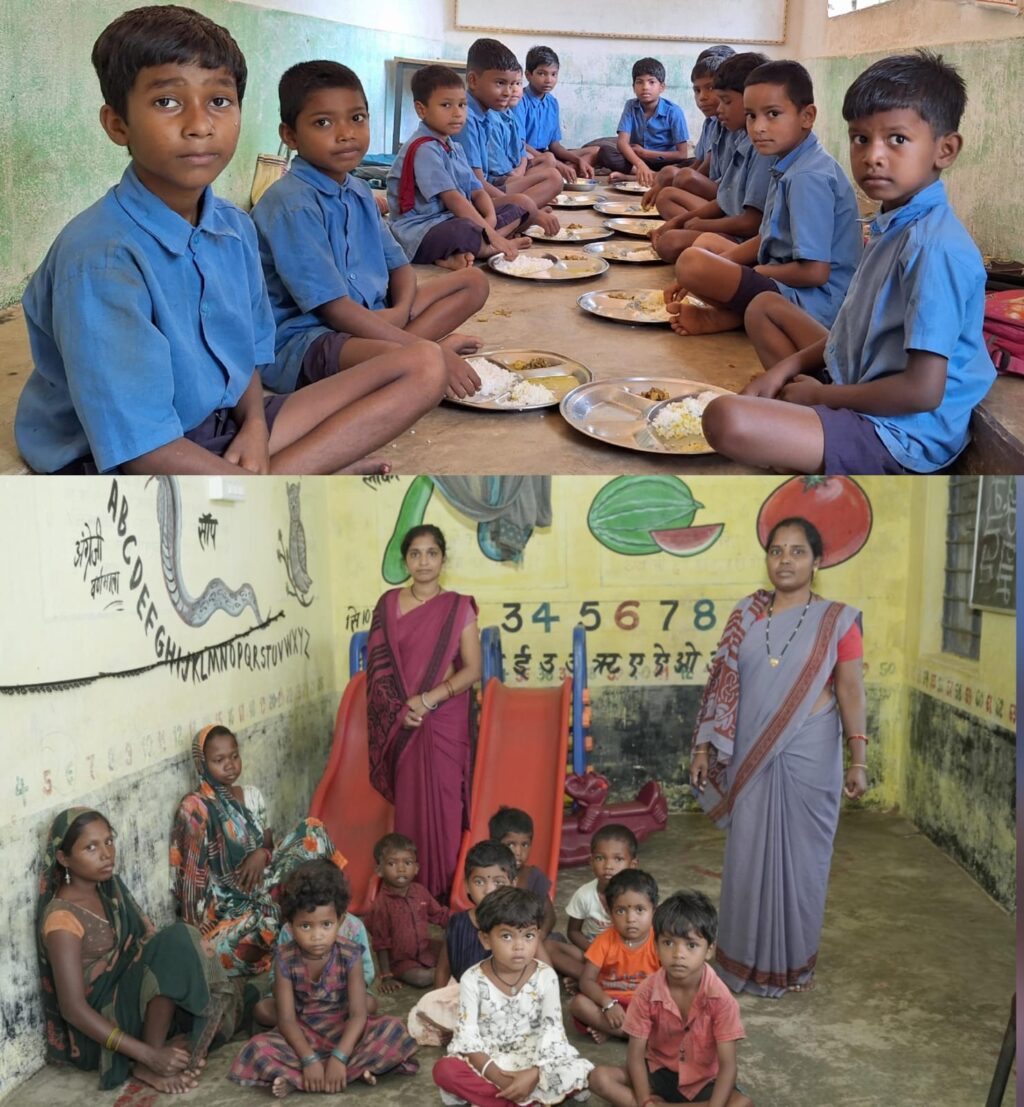Children’s Health Improving in Anganwadis and Schools

Raipur, 31 August
Children studying in anganwadis and schools are now noticeably happier. Schools and anganwadis are opening on time, and children are being served energy-packed breakfasts such as kheer, puri, halwa, khichdi, poha, bhajiya, and seviyan (vermicelli). The use of gas cylinders for cooking has eliminated the smoke that previously filled kitchens, bringing relief not only to cooks but also to students and teachers.
Following the instructions of Chief Minister Shri Vishnu Deo Sai, breakfast is being provided in all anganwadis and primary/middle schools of Korba district through DMF (District Mineral Foundation) funding. This initiative, along with the provision of cooking gas, has increased children’s interest in attending school and anganwadis. Based on a set menu for different days, breakfast and meals are being served. Children are excited to eat and are now arriving at school on time.
At Dhobghat Primary School in Podhi Uproda block, students like Priyanshi (Class 1), Vinay, Neha (Class 2), Roshni and Narmada (Class 3), and Bhupesh (Class 5) shared that they now enjoy a different breakfast item every day—kheer, puri, halwa, khichdi, poha, bhajiya, and seviyan. Headmaster Mr. Chain Singh Puhup said the breakfast has had a positive impact on the children. The gas cylinder setup allows for faster cooking, making it easier to prepare both breakfast and the midday meal.
Even in remote villages like Lampahad in the Korba development block, the nutritious breakfast is making an impact on Pahadi Korwa tribal children. Whether at school or the anganwadi center, their attendance is now regular. Earlier, these children would head to the forest with their families early in the morning. Now, they arrive at school before time. Anganwadi worker Sushila Tirkey and assistant Sulochani Yadav explained that most children at the center belong to the Pahadi Korwa tribe and do not receive adequate nutrition at home. Breakfast and lunch at the center are proving essential for their physical development. Breakfast is served around 10 AM, followed by lunch at 1 PM.
Pahadi Korwa children Sampati, Raveena, Sukhmania, Sushil, and Kavita, who attend the anganwadi, shared that they had porridge for breakfast and dal, rice, and vegetables for lunch. They said they enjoy hot items like bhajiya, poha, kheer, puri, and upma, which are served every day. Assistant cook Sulochani Yadav explained that earlier, especially during the rainy season, lighting wood-fired stoves was very difficult. Gathering dry wood and cooking in the smoke was a struggle. Now, with gas stoves, meals are prepared quickly and without hassle.
Even in primary and middle schools in Lampahad, attendance of children from particularly vulnerable tribal groups (PVTGs) has increased, along with interest in breakfast and midday meals. Devshila and Phoolmania, students of Class 4, said they enjoy the school breakfasts.
In Pandopara, a remote village in Pali block, about 25 children attend the primary school. The anganwadi is run in a newly constructed building. Both centers serve breakfast and meals on time. Pooja Pando, a local resident and mother of five children—one in anganwadi and two in school—said that all three now receive breakfast and lunch. Earlier, they would make excuses to skip school, but now they go regularly. The local administration has instructed all schools to display the breakfast menu and to serve food based on local availability and children’s preferences.
Over 2.25 Lakh Children Benefiting
Around a year ago, on 14 August 2024, hot breakfast service was started in Podhi Uproda and urban areas of Korba block. After observing the positive impact over 2.5 months, the initiative was extended to all blocks of the district. Following the Diwali break, the programme was implemented in Korba, Pali, Kartala, and Katghora schools as well. Gas cylinders were provided to all anganwadis, schools, and hostels, with monthly gas refilling also ensured.
In Korba district, there are 2,602 anganwadis, with 48,217 children aged 6 months to 3 years and 56,477 children aged 3 to 6 years registered. Similarly, 73,810 students are enrolled in 1,502 primary schools, and 47,122 students in 537 middle schools. All of these children are now benefiting from breakfast and midday meals. Cooking arrangements, including gas cylinders, have been made using DMF funds.
